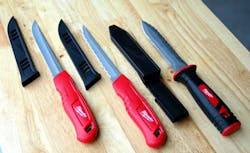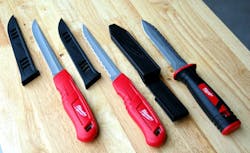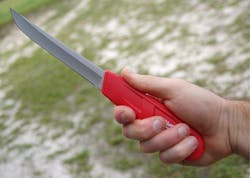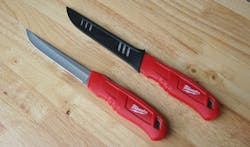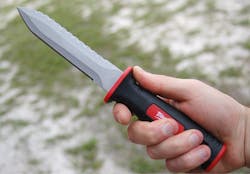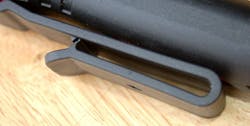Milwaukee Insulation Knife & Duct Knife Review
New ways to cut old building materials
Ed's Note: This comprehensive tool review is reprinted with permission from ProToolReviews.com, a comprehensive tool review website, as the name infers. If you are a tool junkie, you should go there and dig through their ditches. There's a lot.
When we were shown the new Milwaukee Insulation Knife and Duct Knife in Wisconsin earlier this year, the design struck me as being a solid step forward. The story behind how the insulation knives hit their radar got my attention. Like other innovative products, Milwaukee went to the end user to see what was going on around the jobsite.
Milwaukee Insulation Knife
The Milwaukee Insulation Knife come in two varieties – smooth edge and serrated edge. Normally, I like to tell you about the blade material as a way to understand it’s hardness, edge retention, and other properties.
All Milwaukee will let me say is that the blend is proprietary. What they will tell us is that it holds an edge twice as long.
I’ll take that kind of edge retention. Both knives also feature a full tang. No matter what kind of knife handle you have, a common failure is for the partial tang to put enough pressure on the handle to loosen. Eventually, it will start slipping out or it will work through the handle material and come out the side.
A full tang helps reduce the risk of failure enormously.
Each knife comes with a plastic cover that locks into place. I found it to be adequate for the job – not overly tough to take off, not so loose that you risk it falling off. There is also an integrated lanyard hole. These are all but standard now. Anyone working with a knife at height really needs to have it tethered for safety.
A rounded handle offers the ability to smooth out tapes and adhesive laps.
I did the typical “shave some arm hair” test when the knives came in. Truthfully, I wasn’t impressed. On the other hand, when I started doing some cutting, I realized that wasn’t necessarily what the edge was designed for.
Despite my initial disappointment, it made a very smooth cut on the paper cut test. Taking it to its design intent, I was thrilled with how well both the smooth and serrated knives cut through insulation.
Okay, I’ve been cooking since I was 10 and I’ve been the primary cook in the house every moment as an adult. You can’t possibly tell me that you took a kitchen knife to make it better and expect me to not try it in the kitchen.
Remember how pros were raiding the kitchen for knives? The Milwaukee Insulation Knife is going to reverse that trend.
My friends, if the cook in your house gets their hands on these, you will not see them again. Cutting meat, vegetables, and even slicing sushi rolls is an outstanding experience. My apologies Bobby Shaw, I could not help myself.
On a happy note, there hasn’t been a hint of rust or other water damage.
Please don’t cut insulation and then offer these to your wife for kitchen knives. That’s not what they’re designed to do (even if they do a really good job).
Each knife runs less than $15 and is covered by Milwaukee’s Lifetime hand tool warranty.
Milwaukee Duct Knife
The new Milwaukee Duct Knife shares some characteristics with the Milwaukee Insulation Knife. It also features a full tang blade and lanyard hole. The double-sided spear point blade has a straight edge on one side, serrated on the other.
This was primarily design for HVAC pros cutting duct board, insulation, and flex duct.
For insulation, I preferred the insulation knives, but the duct knife is still quite effective. Featuring a shorter 5.5″ blade, this was excellent for the duct work applications. With their proprietary steel blend and treating processes, the Milwaukee Duct Knife claims 5 times the edge retention of its competition.
Looking like a cross between a dive knife and something from a Rambo movie, the Milwaukee Duct Knife comes with a plastic sheath.
This is where my only complaint is. The knife sits well in the sheath and I don’t feel there’s a risk of it coming out accidentally. However, the integrated belt clip could stand to be stronger.
If you’re actually clipping it to a belt, the bottom will catch it well and it works fine. However, if you’re just clipping it to your waistband, the knife tends to bring the sheath with it.
The Milwaukee Duct Knife is selling for under $20 and is covered under Milwaukee’s Lifetime hand tool warranty.
